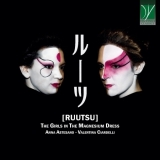Ruutsu heisst so viel wie Wurzeln. Es geht es also hier um japanische Musik bzw. ihren Einfluss auf die europäische und umgekehrt. Im Sinne der minimalistisch besetzen japanischen Ensemble haben sich die beiden Interpretinnen hier nur mit Harfe und Kontrabass an die Interpretation sowohl japanischer wie europäischer Stücke und eigener Kompositionen und Bearbeitungen der Interpretinnen gemacht, die diese wechselvolle Beziehung beleuchten.
Herausgekommen ist eine eher meditativ nachdenklich wirkende Sammlung von Werken, die klar die asiatischen Elemente hören lässt. Vielfältige Bezugnahmen, etwa auf Giacomo Puccini, Igor Stravinsky, aber auch Frank Zappa kann wahrnehmen, wer sich dieser Einspielung widmet. Beide Interpretinnen beherrschen ihr jeweils Instrument und können so die von ihnen erkannten Reize dieser musikalischen Welt herauskitzeln.
Dass sie für die Fotos im Beiheft in Masken japanischer Theaterbemalung schlüpfen, komplettiert dann das Bild. Bei ihrem Spiel wechseln sie dann auch ab und zu die Rollen und die Bassistin spielt die oberen Stimmen während sich die Harfenistin in die tiefen Regionen zurückzieht. Außerdem entwickelt die CD im Laufe der Spielzeit noch eine größere Vitalität, so dass der sehr meditative Einstieg nicht beibehalten wird. Wer sich dieser Sphäre annähern möchte, kann hier seine ersten Yoga-Hörübungen machen.
Ruutsu (ルーツ, Japanese katakana alphabet) means “roots”. Actually the CD is about Japanese music and its influence on European music and vice versa. In the spirit of the minimalist Japanese ensemble, the two interpreters here have set out with only harp and double bass to interpret both Japanese and European pieces and the interpreters’ own compositions and arrangements that illuminate this changing relationship.
The result is a rather meditative and thoughtful collection of works, which clearly shows the Asian elements. Whoever listens to this recording can perceive various references to Giacomo Puccini, Igor Stravinsky, but also Frank Zappa. Both interpreters are masters of their respective instruments and are thus able to tease out the charms of this musical world that they have recognized.
The fact that, for the photos in the booklet, they slip into masks of Japanese theater completes the picture. In their playing they change roles from time to time and the bassist plays the upper voices while the harpist retreats into the lower regions. Moreover, the CD develops even greater vitality in the course of the playing time, so that the very meditative beginning is not maintained. Those who want to approach this sphere can do their first yoga listening exercises here.
























